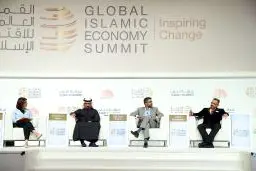PHOTO
Global sales of halal products have surged in recent years, yet the potential for further growth, both in Islamic and non-Islamic countries, remains vast
Dubai, October 12, 2016 – The success of the halal industry and the vast potential that exists for further growth by leveraging evolving perceptions to nutrition was the subject of discussion by a leading panel of hilal experts on the first day of the Global Islamic Economy Summit 2016.
In a lively afternoon session chaired by Zohra Khaku, Founder of Halal Gems – UK, prominent international authorities working in senior positions within the halal industry shared their insights and deliberated about the current state of the halal market and the numerous opportunities that exist for its development.
The esteemed panel for the session included: Mohammed Badri, Managing Director, International Halal Acc. Forum – UAE; Rafu-uddin Shikor, Managing Director, Dinar Standard – UAE; and Saqib Mohammed, CEO, Halal Food Authority – UK.
With a prospective customer base of approximately 1.6 billion Muslims worldwide, and US$1.1 trillion currently spent every year on halal products, the industry is one of the best examples of a sector within the Islamic economy that has far-reaching, cross-cultural engagement with consumers and manufacturers. There has been a positive shift amongst non-Muslims regarding halal food in recent years as changing behaviours amongst consumers has placed a focus on the quality of food and where it is sourced from, a core principle of halal since the concept was founded.
Counterintuitively, while a number of non-Muslim countries have recognised the opportunity and established a robust supply chain network, Muslim markets remain net importers of halal food. At present, the Organisation of Islamic Cooperation countries import as much as 50% of their vegetable products, 32% of processed food, and 18.5% of animal products.
Mohammed Badri, Managing Director at the International Halal Acc. Forum – UAE, commented: “The halal industry has made vast strides in recent years as consumers become more inquisitive about where their food is sourced from. Greater coordination and standardisation globally about what constitutes halal food is a barrier that can, and needs to be, overcome, in the coming years to ensure that the sector’s full potential is attained in the Islamic world.”
Rafu-uddin Shikor, Managing Director of Dinar Standard – UAE, agreed averring: “There is an understanding in many western markets that halal food is synonymous with healthy food. The industry needs to be ready to capitalise on this, as it is a positive association for the Islamic faith. Muslim countries in particular need to try and become better at producing halal food as there is a huge opportunity on offer which is currently being seized by countries such as Brazil and Australia.”
Saqib Mohammed, CEO at Halal Food Authority – UK, concluded: “The future prospects for the halal are extremely bright. The youth of today is extremely engaged in such matters, and beyond food, there is a whole industry that can be tapped, such a halal chains of restaurants or hotels specialising in halal products. Better collaboration and an international standardisation of halal products will help to catalyse the sector for future growth.”
-Ends-
For More information, kindly contact:
Maha Abu Khater
mahaAbukhater@bm.com
0505811262
Omar Badran
Omar.badran@bm.com
0503695040
© Press Release 2016




















